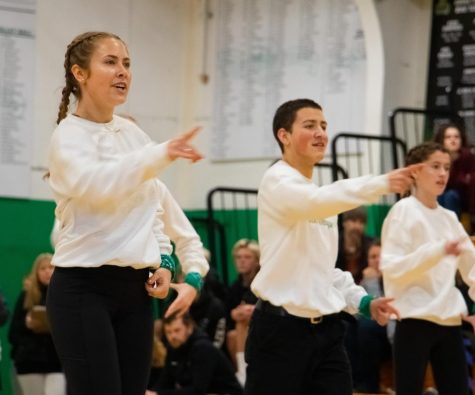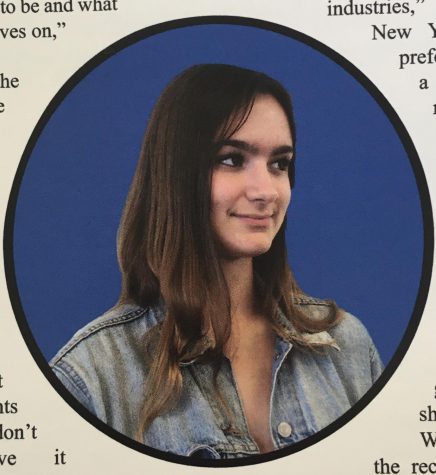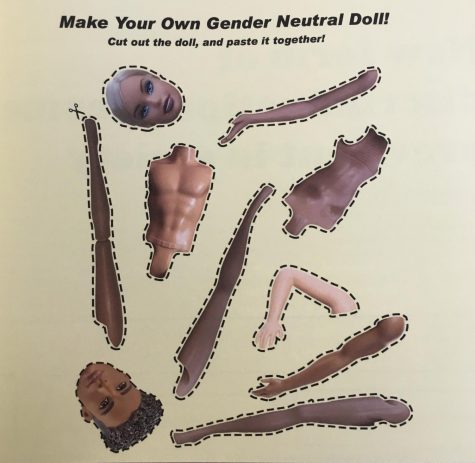Choice picks of music released in 2017, Part 2
December 18, 2017
IDK – IWASVERYBAD
Photo Courtesy of iwasverybad.com
IDK (fka Jay IDK) is a pioneer of his own genre; sub-trap. He defines it as “trap with substance,” reminiscent of projects such as Kevin Gates discography and Kendrick’s DAMN.
IDK’s emphasis on conceptual projects and autobiographical storytelling gives IDK a unique identity in today’s overcrowded hip-hop landscape.
Even if IWASVERYBAD wasn’t the most cohesive album, it’s still notable for two reasons; it’s probably the only album that features both MF DOOM and Chief Keef, two iconoclasts from disparate ends of the musical spectrum, one an underground hero and another a drill music child prodigy, and for the fact that IWASVERYBAD is accompanied with an Adult Swim TV series.
IWASVERYBAD is an analysis of the apple of America’s obsession; the criminal lifestyle portrayed in seemingly every music video and TV show.
IDK, a young man from a stable home, had the prospects of academic pursuit and an illustrious career, but instead squandered his opportunities on petty crime eventually leading to his incarceration.
This dichotomy is present throughout the album’s 10 track duration, which includes cinematic dialogue medleys and beautiful background vocals provided by anonymous choral singers.
Continuing a tradition followed by almost every major rapper, IDK dedicates a two-part song to his deceased mother poignant enough to send tears rolling down the cheeks of the hardest men and women.
Sabrina Claudio – About Time
Photo Courtesy of Genius
Following the path set by predecessors such as Sade and Amel Larrieux, Sabrina Claudio has a transcendental voice but dials it back to create a certain late night atmosphere.
Sabrina Claudio soothes the ears but doesn’t whisper at an inaudible volume, every syllable she croons is clearly understood.
While she’s only 21, her music has a certain maturity to it, separating herself from her peers, who are often superfluously vulgar in a way that detracts from their songs’ narratives.
About Time makes no concessions to a pop audience, features no cursing and doesn’t include any rolling hi-hats, it’s an unadulterated body of work with a unique musical identity.
The songwriting has a cosmic presence to it, brimming with detail like a novel you’d find on your bookshelf. The instrumentals were produced mainly by Stint, a name I’m not too familiar with but despite his (or her) lack of star power provided the perfect background for Claudio’s intricate harmonies, simple enough not to distract but simultaneously intricate like medieval tapestries and handwoven wicker baskets.
The drum patterns on the album are very minimalist, not in a jarring, industrial manner but deliberately soft in a way that diverts attention to the sultry basslines and lush string arrangements that populate the project.
I can’t pinpoint exactly why, but “Stand Still” was the track I gravitated to most, if you’re an alternative R&B enthusiast it’s the song I’d recommend.
J.I.D. – The Never Story
 Photo Courtesy of HipHopDXPhoto Courtesy of
Photo Courtesy of HipHopDXPhoto Courtesy of
Aside from a brief “real hip-hop” phase in middle school, I’ve never really bought into the J. Cole hype,
I always felt like there was some element that his music was missing. However, I do respect his ear for talent, specifically his signing of wordsmiths Bas and JID to his Dreamville imprint.
JID is from Atlanta, but doesn’t sound anything like it’s current artists. His voice has been described as a mesh of Anderson .Paak (an amazing R&B singer, listen to Malibu if you haven’t already) and everybody’s favorite rapper Kendrick Lamar.
His debut album The Never Story was released this spring, and while acclaimed by pundits and bloggers, it took several listens for me to appreciate it.
At first, I perceived it as just another album, but as I grew with it I understand the meticulous work put into each song.
JID tackled poignant topics with a stoic delivery, letting loose one grand slam of a rhyme scheme after another like it was nothing.
JID’s charisma is off the charts, and his high-pitched, Lil Wayne-esque vocal tone perfectly complements his artful wordplay.
Standout selections from the project are the bookenders “General” and “LAUDER”, where he spits for 4+ minutes like it’s nobody’s business. “Hereditary”, a master class in vocal intonation, conveys heartbreak and balances out The Never Story thematically.
Daniel Caesar – Freudian
Photo Courtesy of Genius

I saw Daniel Caesar’s single “Get You” (with Kali Uchis, another great artist)
on my YouTube recommendations and was enamored instantly.
The song’s mellow groove and ethereal synths went perfectly with Caesar’s dreamlike voice and surreal songwriting.
Caesar’s debut album Freudian is an encapsulation of that philosophy, with nothing else released this year sounding remotely like it.
Every song is steeped in gospel influence (he got his start in a church choir) and Bootsy Collins style funky basslines, a rarity nowadays.
The album can be awfully slow at times, but that’s the intention, it’s tranquillity consolidated into a 10 track project. It wasn’t intended for those with short attention spans, it’s not trap-styled R&B for the youth but soul food for those mature enough to consume it.
Smino – blkswn
Photo Courtesy of Genius
Lyrically, St. Louis singer/rapper hybrid Smino is mundane, but his ability to manipulate his voice and weave through tonal ranges like a chameleon changes colors is nothing short of amazing.
I’ve never heard anyone quite like him before, and I doubt I ever will. The closest someone’s come is Young Thug, who’s equally innovative but just doesn’t have the same appeal to me.
His debut album blkswn clocks in at a whopping 19 tracks but manages to remain fresh throughout.
In today’s short-attention span landscape, just imagining sitting do for that long seems inscrutable but I can say with the utmost sincerity it’s totally worth it.
Smino and his guests, mostly female singers from his Zero Fatigue collective, blend rap with melody into a deadly combination that would make Max B and the Bone Thugs blush.
The content rarely deviates from recreational drug use and casual hookups, but as the old adage goes, it’s not about what you say but how you say it.
Big K.R.I.T. – 4Eva is a Mighty Long Time
Photo Courtesy of Genius
Along with J. Cole, Kid Cudi and Drake, Big K.R.I.T. was one of those foreseen to take over the rap game in the late 2000s.
After having an anti-climatic, stagnant career for several years, Big K.R.I.T.’s 2010 mixtape Krit Wuz Here turned the tides of his career, earning unanimous appeal from bloggers and a spot on the heralded XXL Freshmen list. Unfortunately, his movement never really took off like that of his peers, which was a blessing and a curse for K.R.I.T.
Producing his own beats, singing in a mesmerizing manner and rapping exceptionally, his multi-talents were poised for stardom that never really materialized. Inspired by Southern pioneers like UGK, OutKast and 8Ball and MJG, K.R.I.T. alienated casual listeners not only with his deep Mississippi twang but with his brutally honest subject matter. While signed to Def Jam, a major label focused on marketing expendable singles to the masses, K.R.I.T. managed to churn out yearly album quality mixtapes, emphasizing cohesion and authenticity over trends.
After releasing his acclaimed 2015 project It’s Better This Way, K.R.I.T. took a to hiatus from the spotlight, disgruntled with his treatment from label executives. Behind the curtain, he was terminating his contract with Def Jam and laying the groundwork to distribute his music independently.
Over a two year period, the only content surfacing from his camp were a handful of features and freestyles, not enough for an audience only satiable with full length projects.
His latest 4Eva is a Mighty Long Time met and exceeded any expectations, a double album laden with cinematic instrumentation, jaw-dropping verses and songs that propagate the theme of duality that’s defined his career.
Disc 1, the Big K.R.I.T. side, is aggressive, abrasive and bangs harder than 100 silverback gorillas beating on their chests. It represents the more hedonistic side of his personality, infatuated with candy-painted Cadillacs with 15 inch speakers, stripper poles and the allure of dead presidents.
Guests on the initial disc include Dirty South pioneers T.I., UGK (featuring a posthumous Pimp C hook) and Dungeon Family representatives Sleepy Brown and Cee Lo Green, who unbeknownst to most The Voice viewers was once a well-respected rapper.
Highlights include “Confetti,” “Layup,” an ode to relaxation after hours of keeping your nose to the grindstone and “Aux Cord,” a cinematic joint paying homage to soul heroes such as Marvin Gaye, Barry White and George Clinton.
Disc 2, the Justin Scott (his government name) side, ventures into the contemplative side of his music, in vein of previous fan favorites like “Neva Go Back” and “The Vent.”
Although it lacks features from fellow rappers, Disc 2 includes contributions from acclaimed vocalists Joi, Bilal and Jill Scott – sprinkling some soulful spice onto the already musically nutritious project.
Conceptual songs are peppered throughout this second disc, solidifying K.R.I.T.’s reputation as a versatile MC. “Keep the Devil Off” confronts the temptations of avarice and libation, universal themes explored further on ”Mixed Messages,” the album’s centerpiece, a representation of his artistic dichotomy.
XXXTentacion – 17
 Photo Courtesy of Genius
Photo Courtesy of Genius
I was blown away by his singing ability and aptitude for blending alternative rock with hip-hop, a fusion often attempted but rarely mastered.
The self-aware content, which primarily revolves around his depression, warrants repeat listens and is perfect for any downward spiral you may be experiencing.
It’s far from a perfect album, but for me 17 stood out with its idiosyncratic musical identity. To describe X as a person, however, would require some words I’m not at liberty to include here.
Lil Uzi Vert – Luv is Rage II
Photo Courtesy of Genius

Throughout history, elders have always complained about younger generations.
Whether it is their behavior, clothing, or taste in media, annuated individuals are continually pointing a finger at teens and 20 somethings lamenting about how things were “better in their day.” That may be true, but nostalgia is deceiving, the memories one associates with a certain time period encouraging them to overlook evolution.
I repeatedly overhear people hurrahing about how “the new movies suck” and how “90s rap was better,” but I doubt they actually cast much attention on what’s hip and contemporary. The quality of the music hasn’t changed, but the audience and what they seek has – lyricism and polysyllabic rhyme schemes have taken a backseat to melody and experimental song structure.
Lil Uzi Vert Luv is Rage II is probably my favorite album of 2017, and while objectively it may not be the best body of work, it still tops my Apple Music most played playlist.
Uzi, the protege of industry veterans DJs Drama and Don Cannon, is one of the premier faces of the SoundCloud rap (also known as the New Wave) movement, an underground phenomenon that crossed over to teenybopper audiences and launched the stardom of artists like Lil Yachty, Lil Pump and Kodak Black.
I swear there’s someone new blowing up on a weekly basis, but if there’s one new artist I’d champion it’s Uzi.
He’s known mostly for his atrocious verse on the Migos hit “Bad and Boujee,” which left a bitter, brittle taste in my mouth redeemed by “XO Tour L!fe.” His rapping is comedically subpar and at certain points it’s physically impossible to decipher what he’s saying, but he conveys emotion in a manner a traditional 16 never could.
The song is billed as “Alternative Rock,” a proclamation not quite true but understandable considering Uzi’s well-known appreciation for punk forerunners like Marilyn Manson. The song, which revolves around an unhealthy relationship and his self-medication to cope, struck a chord with me in a way that few things in life ever have.
I could profess my love for “XO Tour L!fe” all day, but the rest of the album is equally noteworthy, from the triumphant opening “Two,” an assertive number coronating his position on hip-hop’s throne to the sappy reassurance of “The Way Life Goes.”
The album certainly has some repetitive moments, but Uzi’s minor stumbles are overshadowed by his aptitude to weave between vocal registers and slither between flows.
Like his previous projects Uzi vs. The World and Perfect Luv, Rage II has a minimal guest list, the only collaborators being the brooding R&B star The Weekend and the radiant N.E.R.D. frontman and Neptunes beat wizard Pharrell Williams, who deliver excellent contributions that don’t overpower Uzi’s charisma but instead accentuate it.






